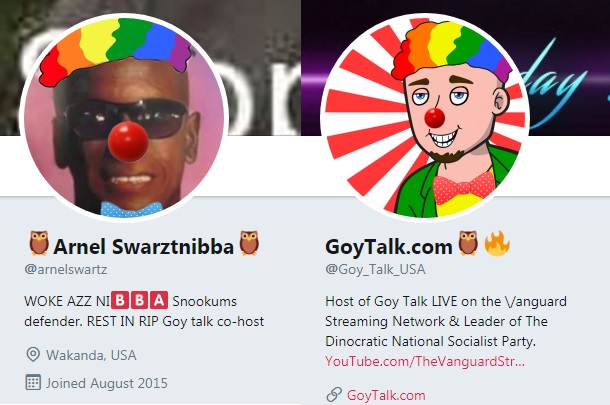Online personalities in far-right and white nationalist online circles are attempting to attribute racism and anti-Semitism to an image of cartoon character Pepe the Frog depicted poorly drawn and as a clown, and that effort has gained notable traction in recent months. Far-right proponents want the broader internet to believe the character directly represents their worldview, but the situation in whole represents an attitude shift in far-right circles online and a slow inching toward even more radical elements of the movement.
The clown render of Pepe the Frog, which KnowYourMeme researchers have identified as being known as “Honk Honk” or “Honkler,” began spreading across the internet last year. In recent months, the meme has gained a foothold in the far-right and is bleeding into racist propaganda. Pepe the Frog, originally from the comic series “Boy’s Club,” was co-opted by an iteration of the white nationalist movement that emerged in 2015 and dubbed itself the “alt-right”—a term created as part of a strategy to obscure the inherent racism and antisemitism of the movement in hopes of making its agenda more palatable among conservatives.
On 4chan, there is an abundance of memes depicting the character lynching black people (depicted in stereotypically racist ways), operating gas chambers, and deploying racial slurs. On February 11, users on 4chan’s “politically incorrect” forum board launched “operation honk,” a campaign with the mission of spreading the character across the internet and boosting its popularity, and then returning the character back to 4chan where it could be associated with racism. The “Operation Honkler” post cited by KnowYourMeme reads: “They will adopt our child, and post Honkler on social media under mainstream memes already in circulation. There will come a time when we must take him back. … Whether of the HONK or not, we must perpetuate this meme to show the world our ideas.”
The sentiment of the “Honkler” meme has also appeared in written format on venues where images won’t fit. A clown emoji and a globe emoji together has been used to convey the phrase “clown world” where the phrase isn’t written out fully. Such references can be found in numerous Twitter profiles, including that of Rebel Media personality Martina Markota, who Salon reported in 2017 as having ties to the far-right. “Honk Honk” memes were also used by “Microchip”—a pseudonym used by a far-right troll who made waves propagandizing in favor of Donald Trump during the 2016 election— to replace slurs and curse words in his posts on Gab.

The phrase “clown world” and accompanying emojis unify far-right social media users in their exasperation over an imagined state of collapse in the Western hemisphere that they largely blame on immigrants and minority groups. The force driving “Honkler” across the far-right is the same bleak worldview that led white nationalists to embrace Democratic presidential candidate Andrew Yang. In their minds, if there is nothing that they can do to stop the supposed “great replacement” of white people in their “homelands” and no politicians who care enough about their cause to implement real policies that favor their agenda, they may as well accept the outcome and wrench whatever they can out of the system, like Yang’s promise of $1,000 per month universal basic income. This mentality is often referred to as “black pilling.”
Understanding Yang Gang:
1. The country is doomed
2. The rules don’t matter
3. We might as well get $1,000 a month— Nicholas J. Fuentes (@NickJFuentes) March 13, 2019
“Honkler” and “clown world” memes were recently incorporated into “Goy Talk,” a new but growing web-based white nationalist podcast. The show’s hosts advocate white nationalism in a detached way, and embody the same increasingly nihilistic attitude among the white nationalist and white supremacist movements in the United States conveyed in the repetition of the phrase “clown world.”
“Goy Talk” hosts express racist and anti-Semitic views as a staple of their programming, with guests that include David Duke, Christopher Cantwell, and Patrick Little. Nevertheless, they are ultimately nihilistic about the state of the world and their ability to change it without mass-organized action reminiscent of the violent writings of James Mason in his book, “Siege.”
A March 28 episode of “Goy Talk” opens with a heavily edited video featuring the Honkler character, and one of the display images used for a show host is edited in “Honkler” style. Additionally, the hosts of “Goy Talk” have modified their profiles on Twitter to include clown imagery.

The Twitter account for “Goy Talk” posted an image yesterday of an anti-Semitic meme modified to depict a racist caricature as a clown.










